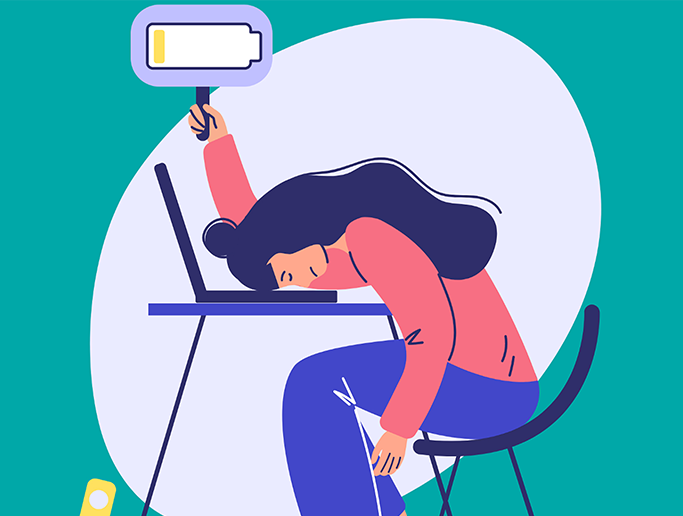
If you feel exhausted and frustrated by your job, it may be burnout. Burnout is a syndrome that affects people in many different fields, including health care. It can happen when you feel overwhelmed and exhausted at work, which affects your ability to act professionally. If you have symptoms of burnout—or if you suspect that someone you know might be suffering from burnout—you can get help from a doctor or mental health professional who specializes in this condition. In this post we'll take an in-depth look at what causes burnout as well as how doctors treat it and whether there are any cures out there for this condition.
How can I know if I'm burned out?
Burnout is a complex term, and there are many factors that can cause it. The most common symptoms include physical or mental exhaustion, feeling like you can't keep up with your daily activities and responsibilities, feeling hopeless about the future, losing your sense of purpose in life or work, and feeling out of control over what you do each day.
It's important to remember that burnout doesn't necessarily mean that you're doing something wrong at work; it also could be caused by external factors such as family problems or financial issues. If you think you might be burned out on the job because of these other issues outside of work (or if your job itself isn't causing any stress), then this article won't help much in determining whether there's an issue at hand.
What causes burnout?
Burnout is a state of mental and physical exhaustion that can occur when you feel like your job is taking over your life. It's not just about being tired; burnout occurs when you're feeling drained in multiple areas of your life, whether it's from work or personal relationships.
Burnout can occur for many different reasons, including:
- Overwork - Working too much with no breaks or time off can cause an imbalance between what you do at home and at work. This can lead to higher stress levels because people often take their frustrations out on loved ones when they are overwhelmed by their jobs.
- High stress - Stress comes from feeling like there are never enough hours in the day to get things done or feeling overwhelmed by responsibilities that need to be taken care of immediately (like getting work done while also managing other aspects of life).
- Lack of self-care - When people don't take time out for themselves, they may burn out faster than those who do take care of themselves physically and emotionally through activities such as exercise, meditation or taking a hot bath every night before bedtime."
What should I do if I suspect I'm burned out?
If you feel burned out, the first thing to do is take a break. Take a vacation or spend time with friends or family. You can also ask for help from your doctor, who may be able to prescribe medication or recommend an anti-depressant. If you're feeling especially overwhelmed by the situation, consider seeing a therapist as well.
Additionally, certain strategies can help ease feelings of burnout and prevent it from getting worse in the future:
- Get enough sleep! Try going to bed earlier than usual and waking up earlier too (this will make it easier to get started on your tasks).
- Practice mindfulness meditation; this will help you focus on what's happening right now so that you're not worrying about everything else at once!
- If something makes you happy—for instance, playing video games—then do it more often! It's healthy for everyone when they find something enjoyable in life (and most people enjoy playing video games).
How can my doctor help me with burnout?
Your doctor can help you to diagnose the cause of your burnout, and determine whether there are any underlying medical causes. If your burnout is caused by a physical illness, or if it is related to another mental health issue such as depression or anxiety, they can refer you to a therapist that specializes in helping people with these issues. If this is not the case, your doctor may prescribe medication specifically designed for people with burnout syndrome.
Is there a cure for burnout?
There is no cure for burnout, but there are treatments. The foremost treatment for burnout is addressing the underlying issues that led to it in the first place. You can't manage what you don't know about, and in order to treat your burnout symptoms you have to figure out what caused them in the first place so that you can work on getting better
Burnout happens when we've been giving more than we feel like giving—it's a symptom of overextension or overwork. In order to manage this feeling of being overwhelmed by life's demands on us, it's important that we understand where these demands come from and why they seem so daunting at times (and at others not). This means taking some time away from whatever tasks are causing us stress and reflecting on our own lives: What do I need? How am I spending my time? What activities bring me joy? Asking ourselves these questions will help us identify ways we might be able to make changes in our lives going forward so that burnout doesn't happen again
Burnout isn't a diagnosis, but there are ways to treat its symptoms.
It's important to note that burnout isn't a formal diagnosis. The Diagnostic and Statistical Manual of Mental Disorders (DSM-5) doesn't recognize the condition, but it does list symptoms that can indicate stress, depression and anxiety. These include:
- Tiredness or fatigue
- Feeling irritable or having trouble concentrating
If you're experiencing any of these symptoms, it's time to take action by making some lifestyle changes, such as getting enough sleep and exercising regularly. If your symptoms persist for an extended period of time—and they may get worse before they get better—you should speak with your doctor about treatment options.
Burnout is a common experience that many people go through in their careers, but it's not something you can diagnose or cure. That said, there are ways to treat its symptoms and prevent it from happening again. If you suspect that you're experiencing burnout, talk with your doctor about what options might be available for you
Additional Resources
Yes, there are treatments available for burnout. Relaxation techniques such as yoga, meditation, and deep breathing can activate the body's relaxation response[1]. Other treatments include individual psychotherapy, couples and family therapy, medication management, psychological evaluation, and group therapy[2]. Additionally, engaging in regular physical activity[3], getting enough restful sleep[4], and prioritizing good sleep habits, nutrition, exercise, and leisure activities[5]can help with stress.
1. Burnout Prevention and Treatment - HelpGuide.org
Set aside relaxation time. Relaxation techniques such as yoga, meditation, and deep breathing activate the body's relaxation response, a state ...
2. Treatment for Burnout - Breyta Psychological Services
Treatment for Burnout · Individual Psychotherapy · Personal Growth · Couples and Family Therapy · Telehealth · Medication Management · Psychological Evaluation · Group ...
3. Job burnout: How to spot it and take action - Mayo Clinic
Try a relaxing activity. Explore programs that can help with stress such as yoga, meditation or tai chi. Get some exercise. Regular physical activity can help ...
4. Burnout Recovery: 11 Strategies to Help You Reset - Healthline
Make enough time for restful sleep. Spend time with loved ones, but don't overdo it — alone time is important, too. Try to get some physical ...
5. 4 Steps to Beating Burnout - Harvard Business Review
It's essential to replenish your physical and emotional energy, along with your capacity to focus, by prioritizing good sleep habits, nutrition, exercise, ...

